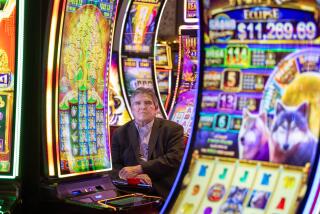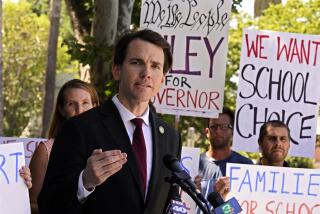Tribe Official Told Not to Associate With Fund-Raisers
A federal judge Monday ordered the politically active chief executive of an influential California Indian tribe to stop associating with campaign fund-raisers for five years, after the executive admitted violating federal campaign contribution laws.
Mark Nichols, the non-Indian chief executive of the Cabazon Band of Mission Indians, pleaded guilty in October to three misdemeanor counts of campaign money laundering. He encouraged Cabazon members and employees to make $1,000 donations to the 1996 Clinton-Gore campaign and Democratic congressional campaigns, then used tribal money to reimburse them.
At the sentencing hearing, Nichols’ lawyer said his client made the contributions to further the interests of the tribe and Indian casinos.
The Cabazons operate the Fantasy Springs Casino east of Palm Springs and plan to significantly expand the operation if, as expected, voters approve Proposition 1A on next Tuesday’s ballot. The measure would grant tribes exclusive rights to operate Nevada-style casinos in California.
U.S. District Judge Audrey B. Collins rejected a prosecutor’s request that she impose a three-month prison sentence on Nichols. But she ordered him to pay a $250,000 fine, spend a month in home detention and serve five years on probation--a period during which he must not “associate directly or indirectly with political fund-raisers,” or attend campaign fund-raising dinners or other events to collect money for political purposes.
Federal prosecutors and Nichols’ lawyers said they were unaware of a similar condition placed on a sentence in a campaign violation case.
“For you or me, this might be a good thing,” said Assistant U.S. Atty. Jeffrey Rawitz, who recommended that Collins bar Nichols from associating with political fund-raisers. “But for his purposes, this significantly limits his ability to be involved politically.”
Nichols and the Cabazons have been politically active for years, hosting fund-raisers for state and federal politicians at their casino and giving large sums to candidates.
The lobby of the tribal administration office shows pictures of Nichols, tribal Chairman John James and others posing with top state and national leaders. The latest Cabazon newsletter shows Nichols posing with Gov. Gray Davis at a conference on water issues last month.
Nichols’ father was a pioneer of tribal gambling, helping the Cabazons open a high-stakes bingo operation in the 1980s. When state authorities tried to shut it down, the Cabazons sued and won a key U.S. Supreme Court ruling that opened the way for expanded casino operations on Indian reservations.
Altogether, Nichols was accused of making $28,000 worth of illegal donations, although under a plea bargain, he admitted to three misdemeanor counts involving $3,000.
“You failed to lead well, failed to lead morally,” Collins told Nichols. “In this case, you didn’t lead legally.”
The sentencing hearing underscored the influence Nichols has over the affairs of the 44-member Cabazon band. In a show of support, Cabazon Chairman James and others from the band sat in the audience as Nichols was sentenced.
Nichols’ attorney, Stanley Greenberg, said Nichols has the authority to grant bonuses to all employees and members, including James. Indeed, Nichols gave James a $3,000 bonus a few days after James wrote two $1,000 checks to a congressional candidate in 1994 on behalf of James and his wife.
Although federal law limits the amounts that individuals can give to candidates, there are no caps under California law, and the Cabazon band was among the largest donors to state campaigns in 1998.
In an indication of the profits associated with tribal gambling, the tiny band gave more than $1 million to state campaigns in 1998, including $115,000 to Davis. Contributions to state campaigns were not a focus of the indictment.
During last fall’s negotiations over the state’s compacts governing gambling with the tribes, Nichols, acting on behalf of the band, presented Davis with an eagle feather, a symbol sacred to Native Americans.
“There is no special relationship,” Davis spokeswoman Hillary McLean said Monday of Davis’ association with Nichols. “He is one of a number of tribal leaders that the governor worked with” during negotiations that led to the agreement to place Proposition 1A on the March 7 ballot.
Since Nichols’ 1998 indictment, Davis has not received Cabazon contributions. Although Nichols attended the state Democratic convention earlier this month, the Cabazons appear to have begun limiting their donations in general. California gambling tribes have raised $21 million to urge passage of Proposition 1A. The Cabazons, however, have donated only $10,065.
After the sentencing, Greenberg said that the judge’s decision to bar Nichols from associating with fund-raisers “did raise a 1st Amendment question,” because it will limit Nichols’ ability to remain involved in politics.
Greenberg said Nichols will be obligated to avoid people who are in the business of political fund-raising and turn down all requests that his tribe give to campaigns. But with Nichols standing by his side, Greenberg said: “It’s probably the best thing that ever happened to you.”
More to Read
Start your day right
Sign up for Essential California for news, features and recommendations from the L.A. Times and beyond in your inbox six days a week.
You may occasionally receive promotional content from the Los Angeles Times.






